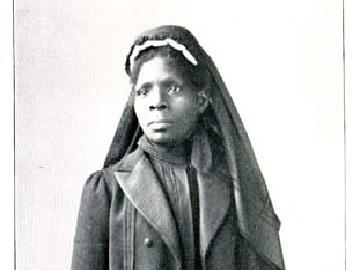
Section Branding
Header Content
Forgotten Women Part 4: Susie King Taylor
Primary Content

Savannah is a place that’s famously full of history. But many of the people who shaped that history, particularly women, are relatively unknown.
So GPB has created a series called “Forgotten Women” looking at some of the untold stories in the region.
Click here to find the rest of GPB Savannah's Forgotten Women series.
As formerly enslaved men gained their freedom during the Civil War, many sought to join the Union Army. Nearly 180,000 men served as Union soldiers in the army’s official black regiments. With them came black women. They weren’t paid, but they traveled with the army, acting as nurses, cooks, teachers, and laundresses. We know few of their names and almost none of their stories, except one: Susie King Taylor. This is her story.
Just steps from the crowded sidewalks and busy construction of Savannah’s Broughton Street, tour guide Vaughnette Goode-Walker leads a tour group into a lane. She points out a low brick building. "We’re here because that carriage house, with the funky DirectTV on top, is where Susie King Taylor lived when she was here in Savannah," she says.
Susie moved into that house as Susie Baker, a seven-year-old who was born into slavery. And despite the laws against it, she got an education - an achievement Goode-Walker admires. "She’s my she-ro, I’ll just put that in there," she says. "Because it was very difficult."
Difficult because before the Civil War, it was illegal to teach African-Americans to read and write. Black children like Susie Baker studied at secret schools operated by their white neighbors. Goode-Walker says it was an open secret in Savannah - but a secret nonetheless. "Every day," she explains, "25-30 kids would assemble, probably we suspect in Warren Square, and make their way in the lane, one by one, and they would wrap their books in paper, have little work cans like they were going to work."
When the Union Army moved to take Fort Pulaski in 1862, the 14-year-old Baker joined the many former slaves who fled to coastal islands. When Union officers on St. Simons Island learned how well she could read and write, they asked her to run a school. She taught children by day -- and newly-enlisted soldiers by night.
University of Georgia history professor Ron Butchart says that was a key part of the Union effort to recruit and retain black soldiers. "As African-Americans begin to join the Colored Troops," he says, "it made a lot of sense for as many of them as possible to be literate."
Susie Baker married one of those soldiers and became Susie King. She spent the rest of the war traveling with his regiment through Georgia, South Carolina, and Florida.
King was far from the only woman living in army camps during the Civil War -- but she’s the only black woman who wrote a memoir about her war experience. Butchart says King writes with a different perspective than the many other firsthand accounts of the war. "The focus on the black experience, on a black woman’s experience, on her efforts to provide literacy for others of her color make it a very unique document," he says.
She writes about the hardships and the joys of camp life -- her camaraderie with the soldiers, her fears for their safety. She learns to wield a musket and improvises comfort foods with condensed milk and turtle eggs. And she reflects on the horrors of war.
"It seems strange how our aversion to seeing suffering is overcome in war," she writes, "how we are able to see the most sickening sights, such as men with their limbs blown off and mangled by the deadly shells, without a shudder; and instead of turning away, how we hurry to assist in alleviating their pain, bind up their wounds, and press the cool water to their parched lips, with feelings only of sympathy and pity."
Near the end of her book, King calls on readers to remember the war - the suffering of the former slaves’ fight for freedom, and the part women like her played. "There are many people who do not know what some of the colored women did during the war," she says. "These things should be kept in history before the people. There has never been a greater war in the United States than the one of 1861, where so many lives were lost,--not men alone but noble women as well."
Susie King continued to teach after the war, returning to Savannah to open her own freedmen’s school.There again, Butchart says, her memoir helps shed light on other teachers like her whose stories have been lost.
"The story’s always been told of the northern white missionary teachers who come into the south," he says. "What my team and I were able to demonstrate is that in the first five years of emancipation, probably 4-5,000 of the 12,000 teachers we can identify were themselves African-Americans."
Eventually she had to close her private school as students left for newer schools they could attend for free. After her husband died, she moved to the north and remarried -- becoming Susie King Taylor. She lived the rest of her life in Boston, where she helped found and run a women’s group advocating for Civil War veterans. Goode-Walker says throughout her life, Taylor showed no fear.
"She’s lived the better part of that 50 years of history that includes the American Civil War, Reconstruction, and easing up into the Jim Crow era here in the South," she says. "Her story is one of a freedom that many people of her era would never have known."
And it’s a story Susie King Taylor chose to tell in her own words.
Tags: forgotten women, susie king taylor, education, secret schools, Civil War, Slavery
